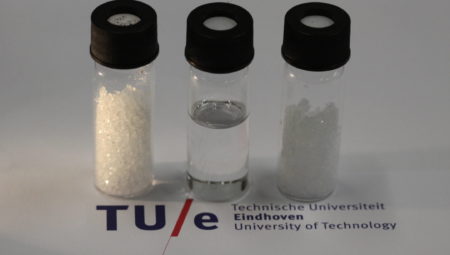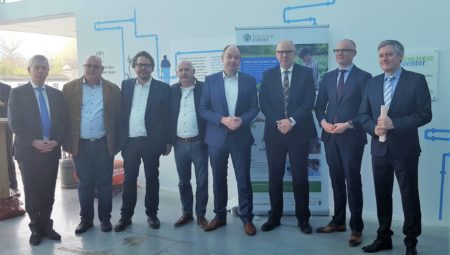This is asserted by Patrick Lemmens, who has been intensively involved in establishing value chains in the biobased domain for more than five years. As project leader at the Greenport Venlo Innovation Centre (editor’s note: the precursor of Brightlands Campus Greenport Venlo), he has supervised and/or initiated the necessary projects in which various partners from the primary sector were – and still are – involved: interesting projects, such as the valorisation of spent mushroom compost or extracts from blueberries. In many cases, however, the route to the market has still not been found. Lemmens believes that this is mainly a matter of time. ‘Most project participants initially thought they would have a product ready for the market within two years. That turned out to be aiming too high.
An average R&D process for a large company also takes around five to seven years. So you cannot expect that groups of SMEs will operate faster. After all, the project partners depend on each other’s speed. Some simply can and do work faster than others.’
Turning point
Another hurdle was that final customers were less interested in main and/or side streams from agriculture. Lemmens now speaks of a turning point: producers from different fields of application are increasingly seeking alternative sources for their raw materials and/or semi-finished products and end up at the agricultural and food sectors that way. ‘A good example is the paper industry, in which certain producers develop and produce high-quality papers that are partly based on plant fibres. The necessary things are happening in the uses for plant components as well, for instance for cosmetics and nutraceuticals. Specific backward reasoning from the applications leads to possible alternative semi-finished products and corresponding processes and raw materials.’
That’s good news, but it does not mean that the primary sector will immediately draw in profit from this development. ‘The farmers are on top of this themselves,’ according to Lemmens. ‘If they portray themselves as suppliers, they end up in a situation identical to that with their primary products. Exchangeability is something you need to avoid. Otherwise you are evaluated purely on price.’ Naive Lemmens asserts that participating in projects in which the primary sector and end customers work together on marketable concepts does not guarantee that these parties will eventually do business with each other.
Lemmens: ‘You would expect that the parties concerned end up with strong ties because they work together so closely, and that this would make the relationships at the negotiation table friendlier. That is simply very naive. Sometimes parties already drop out earlier, during the project, so that there is not even a prospect of a marketable concept. The knowledge and expertise provided by the primary sector, for example about cultivating and processing biomass, gains no extra value or ‘overflows’ to the cooperation partners. It is essential to build up expertise on biomass, for example about breeding, cultivation and pretreatment, but it is also important to make clear agreements in advance. This applies to matters such as knowledge and IP, but also to marketing. I often pose the ‘what if’ question. Suppose there is a prospect of a product-market combination: which parties do you involve in the introduction and how do you approach the market? Parties from the primary sector often have no eye for this yet. It is also a matter of experience; it requires a different mindset. Businesses in agrifood also have to consider supplementary business models in addition to their daily business.’
Forward integration
Besides the knowledge about biomass, say the domain of the primary sector, farmers can also realise their (added) value by integrating forwards, according to Lemmens. ‘There are definitely opportunities in small-scale
biorefinery or pretreatment/reprocessing into useful semi-finished products. Obviously these activities need to be performed in an organised way, for example by a cooperative or a third party, in which farmers can possibly participate. Using the knowledge and expertise accumulated in this phase, parties from the primary sector can set themselves apart on the market: from exchangeable to indispensable.’
One of the projects that arose under the umbrella of the Brightlands Campus Greenport Venlo is Paprikansen, which focuses on the use of certain components in food and pharmaceuticals. The project has now reached the stage where the possibility of translating the knowledge about components into new products based on capsicum is being investigated.
Lucrative
Anton Winkelmolen (Arvalis) has been involved with Paprikansen from the very start. Because the project has now come closer to the market, he is not able to provide details. Capsicum farm Litjens from Meterik in the province of North Limburg is one of the parties involved in the project. Winkelmolen believes new value creation of the farm product are interesting for the grower, because this can provide lucrative extra income in times of overabundance when the capsicum prices drop. ‘It is crucial to find the right partners with the right knowledge; we have continually focused on this in our search. We have spent a lot of time on it, with the result that things don’t always proceed as fast as might be hoped. In practice you can come up with a tight (time) plan, but you always encounter crossroads where it might be more interesting to take a different (roundabout) path. That happened with Paprikansen as well.’
Chickens and eggs
Winkelmolen argues that the challenge of setting up a new value chain lies mainly in finding a good cooperation model with partners. In the very beginning it is too early to make detailed agreements. The market is still very far away and the project can go in all directions. ‘It doesn’t help if you already start bickering about dividing up the chickens when you haven’t even seen any eggs, let alone made sure they have hatched,’ according to Winkelmolen. ‘However, once the investments and interests become larger, both parties will have to put things down in writing.’ That applies to matters such as cash, hours and intellectual property. The last matter is difficult and costly for smaller parties. There are cheaper alternatives, such as specification in dossiers (editor’s note: customary in the pharmaceutical sector). The quality control is important, but the essence of the value that the primary sector can build up lies in the knowledge and expertise in growing certain biomass according to certain specifications and – possibly – reprocess it into useful semi-finished products for market parties. That is what they should put their energy into.’
Paprikansen
The Paprikansen project started at the end of 2012 as a ‘quest’ for possible market paths for components and residual streams from capsicums. It is not just about hard cash, but also about sustainable production and socially responsible business practices.



